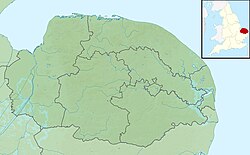| Wild Ken Hill | |
|---|---|
 Aerial view of part of Wild Ken Hill, 2011 | |
Shown within Norfolk | |
| Town/City | Heacham Bottom Farm, Lynn Road, Snettisham, PE31 7PQ |
| Province | Norfolk |
| Country | United Kingdom |
| OS grid | TF6795435823 |
| Coordinates | 52°53′36″N0°29′49″E / 52.89326°N 0.496961°E |
| Established | 2019 (as Wild Ken Hill) |
| Owner | Buscall family |
| Area | 4,000 acres (1,600 ha) |
| Produces | wheat [1] |
| Website | wildkenhill |
Wild Ken Hill is a rewilding and regenerative agriculture project located in west Norfolk, England, at the edge of The Wash. [2] [3]

